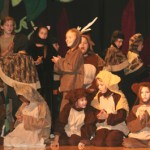The year 2018 marks the 100th anniversary of the birth of a substantial and somewhat controversial force in American cultural life, that of Leonard Bernstein. As a powerful advocate for classical and popular forms of music, particularly those produced in the United States, and as an equally important spokesperson for a variety of activist causes worldwide, he remains as enigmatic a figure now 28 years since his passing.
Noted University of California, Riverside, Osher instructor Diane Mitchell plans to explicate both the man and his legacy in a series of six Monday-afternoon lectures, sponsored by the Friends of the Idyllwild Library, beginning at 2:30 p.m. Monday, Sept. 24, in the library’s Community Room, titled “Thank You, Lenny: Leonard Bernstein and Music in the 20th Century.” All lectures will begin at 2:30 p.m. on Mondays.
The first lecture will examine the background of the first 25 years of Bernstein’s career, with an emphasis on his musical education, and budding compositional and conductorial phases, as well as coverage of his immediate family ties and their part in his development.
Then on Oct. 1, Mitchell covers Bernstein’s world of expanding media in the 1950s and 1960s; his television appearances, Broadway and motion picture scores, and his appointment as permanent conductor of the New York Philharmonic.
The Oct. 15 lecture, will cover the world of Broadway musicals in depth with an examination of both “Candide” and the genesis of “West Side Story.” On Oct. 22, Mitchell will re-examine “West Side Story,” as well as Bernstein’s expanding involvement in the political and social movements of the 1960s.
Oct. 29th’s lecture will take up the socio-political theme once again, as Bernstein becomes more and more of an American activist, and also will examine the controversy surrounding his adaptation of the Roman Catholic rite in “Mass.”
Finally, on Nov. 5, Mitchell will summarize the last period of Bernstein’s life, from Harvard’s Norton Lectures onward, including his advocacy on behalf of the AIDS community.
Admission to the lecture/presentation series is free of charge; however, donations to the library’s Friends are always appreciated, and light refreshment (appropriate to the afternoon) also will be available.
Mitchell’s performances at last year’s survey of American musical theater were both well attended and informative, and a similar outcome for this series is expected. Come join the Friends for an evaluation of the man composer Ned Rorem called “the most crucial musician of our time.”










